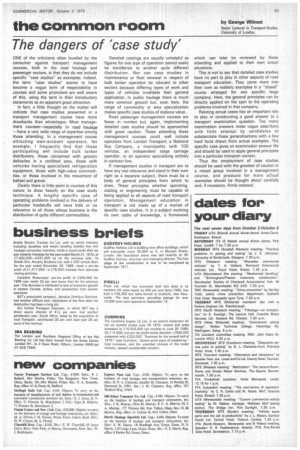The dangers of 'case study'
Page 55

If you've noticed an error in this article please click here to report it so we can fix it.
ONE of the criticisms Often levelled by the consumer against transport management courses, both in the road haulage and passenger sectors, is that they do not include specific "case studies" as examples. Indeed, the term "case studies" seems to have become a vogue term of respectability in Courses and some promoters are well aware of this, using the term in their introductory statements as an apparent great attraction.
In fact, a little thought on the matter will indicate that case studies presented in a transport management course have more drawbacks than advantages. Most management courses—especially in road haulage —have a very wide range of expertise among those attending. In a management course attracting own-account operators, for example, I frequently find that those participating will include bulk tanker distributors, those concerned with grocery deliveries in a confined area, those with vehicles having specialized refrigeration equipment, those with high-value commodities, or those involved in the movement of ballast and gravel.
Clearly there is little point in courses of this nature to draw heavily on • the case study technique. A lengthy specific case of operating problems involved in the delivery of particular foodstuffs will have little or no relevance to all those whose business is the distribution of quite different commodities. Detailed castings are equally unhelpful as figures for one type of operation cannot easily be transferred to another quite different distribution. Nor can case studies in maintenance or fleet renewal in respect of bulk tanker operation be relevant to other sectors because differing types of work and types of vehicles invalidate their general application. In public haulage there is much more common ground but, even here, the range of commodity or area specialization makes specific case studies of dubious value.
Road passenger management courses are fewer in number but, again, implementing detailed case studies should be approached with great caution. Those attending these management courses could well include operators from London Transport, a National -Slue Company, a municipality with 100 vehicles, an independent stage carriage operator, or an operator specializing entirely in contract hire.
If management studies in transport are to have any real relevance and stand in their own right as a separate subject, there must be a body of general principles from which to draw. These principles whether operating, costing or engineering must be capable of being applied to all aspects of road transport operation. Management education in transport is not made up of a myriad of specific case studies. It is a subject evolving its own cadre of knowledge, a framework
which can later be reviewed by those attending and applied to their own actual situations.
This is not to say that detailed case studies have no part to play in other aspects of road transport education. They come more into their own as realistic examples in a "closed" course arranged for one specific large company. Here, the general principles can be directly applied on the spot to the operating problems involved in that company.
Relating actual cases has an important role to play in constructing a good answer to a transport examination question. Too many examination answers make vague assertions with little attempt by candidates to substantiate these generalizations with a few hard facts drawn from actual examples. The specific case gives an examination answer life and should be used to apply general principles into a particular transport context.
Thus the employment of case studies should be used with the greatest of caution in a mixed group involved in a management course, and pressure for more actual examples should be thought about carefully and, if necessary, firmly resisted.












































































































